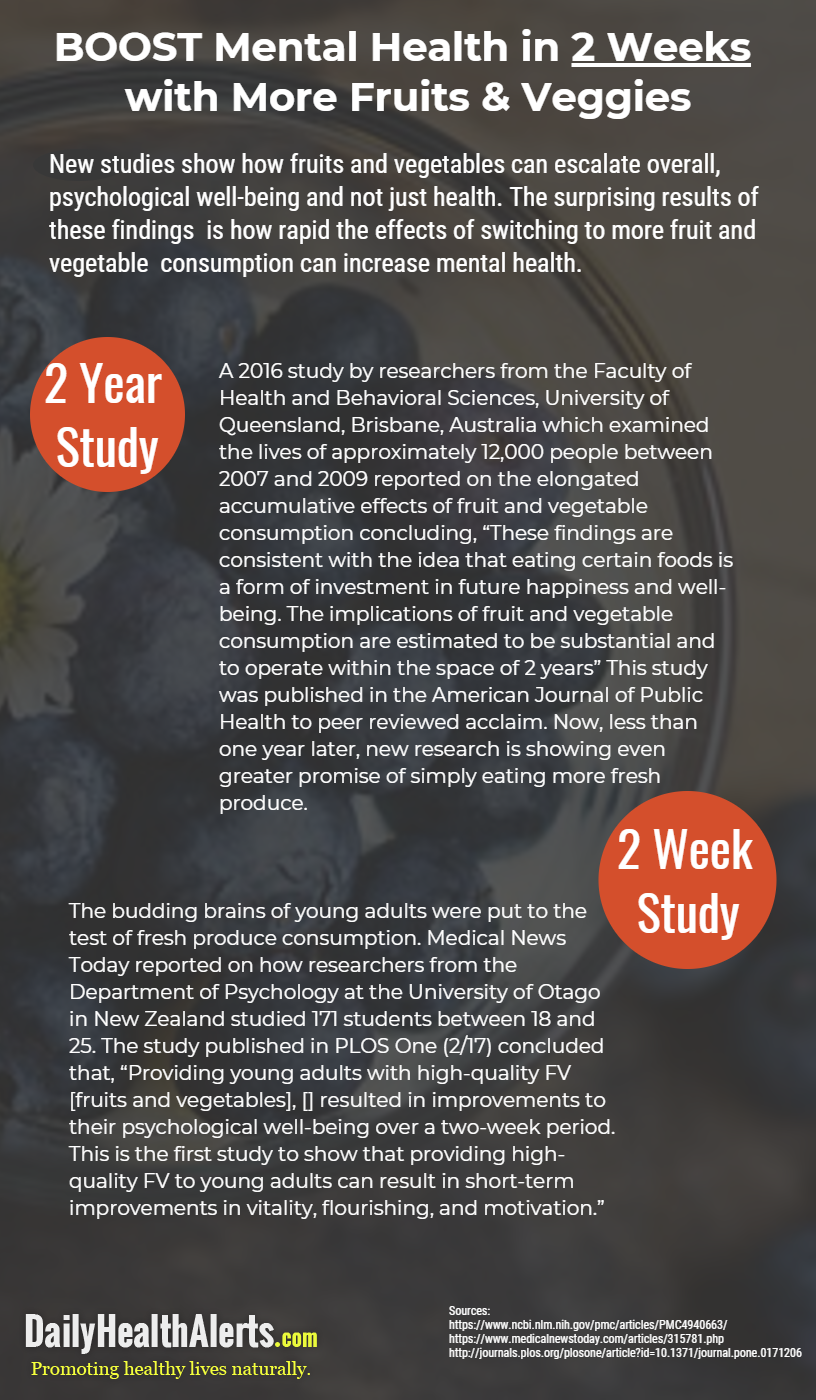It may seem like a no-brainer for better health, yet many people still eschew high consumption of fruits and vegetables for refined, processed foods instead. A donut once in a while isn’t so bad but in-between, rather than more donuts, chips, or candy, take some time to readjust your taste buds by adding more fresh produce.
Processed foods are so overwrought with sugars, oils, and dyes your tongue becomes coated with over sensitization and could weaken your ability to taste real food. Fresh fruits and vegetables in place of processed choices could eventually (in about 21 days) cleanse your palate.
Now, in addition to the many studies showing multiple benefits of fresh produce consumption on the body, new research indicates the ability to boost mental health as well. This includes focus, clarity, happiness, life satisfaction and overall well-being. However, the amazing part of making this change is that research has shown these positive results in just two weeks.
Surprising Brain Enhancement
It was previously thought that fresh, plant based foods mostly increased physical health given the effects on muscle and bone performance. Yet new studies show how fruits and vegetables can escalate overall, psychological well-being too. The surprising results of these findings is how rapid the effects of switching to more fruit and vegetable consumption can increase mental health. This is hopeful news, for if you need an easy boost, changing to less carbs and more locally grown fresh produce could be an easy fix. When combined with a good physical fitness program, this may work better than conventional pharmaceutical methods.
The 2 Year Study
A 2016 study by researchers from the Faculty of Health and Behavioral Sciences, University of Queensland, Brisbane, Australia which examined the lives of approximately 12,000 people between 2007 and 2009 reported on the elongated accumulative effects of fruit and vegetable consumption concluding,
“These findings are consistent with the idea that eating certain foods is a form of investment in future happiness and well-being. The implications of fruit and vegetable consumption are estimated to be substantial and to operate within the space of 2 years”
This study was published in the American Journal of Public Health to peer reviewed acclaim. Now, less than one year later, new research is showing even greater promise of simply eating more fresh produce.
The 2 Week Study
The budding brains of young adults were put to the test of fresh produce consumption. Medical News Today reported on how researchers from the Department of Psychology at the University of Otago in New Zealand studied 171 students between 18 and 25.
The students were divided into three groups and monitored for two weeks. The first group was the base which maintained normal eating habits, the second group was hand delivered two additional servings of fresh fruits and vegetables (including carrots, kiwi fruit, apples, and oranges) each day, and the third group was given prepaid produce vouchers and received text reminders to consume more fruits and vegetables.
At the beginning and end of the study, participants were subjected to psychological assessments that evaluated mood, vitality, motivation, symptoms of depression and anxiety, and other determinants of mental health and well-being. Researchers say that their findings indicate that increasing the intake of fruits and vegetables through personal delivery may lead to rapid benefits for psychological well-being.
The study published in PLOS One (2/17) concluded that,
“Providing young adults with high-quality FV [fruits and vegetables], [] resulted in improvements to their psychological well-being over a two-week period. This is the first study to show that providing high-quality FV to young adults can result in short-term improvements in vitality, flourishing, and motivation.”
Keep on Track
The United States Department of Agriculture recommends two cups of fruit and two to three cups of vegetables daily. This is the basic number and according to the data, increasing this consumption may be beneficial. One cup of fruit is about a large orange or half a grapefruit and a cup of vegetables equates to approximately one large sweet potato or red pepper.
Organic is always recommended but not always necessary as some fruits and vegetables are robust enough to protect against outside influences, namely pesticides. This is best explained in the dirty dozen, clean fifteen list.
See if you can increase your well-being by simply adding fresh fruits and vegetables to your diet. It seems to be one of the easiest ways to walk through life a little lighter.
